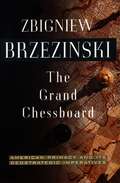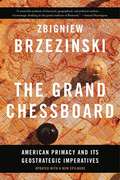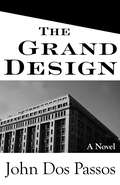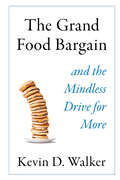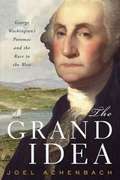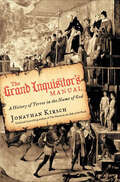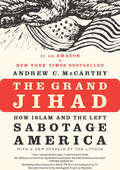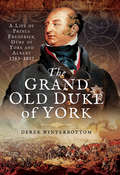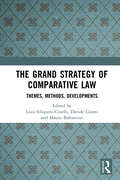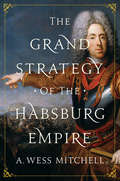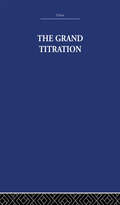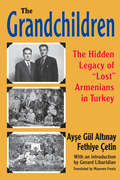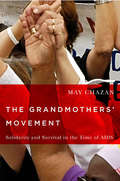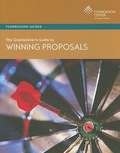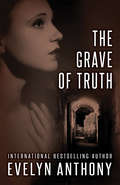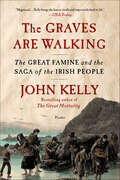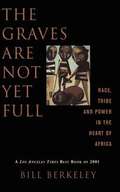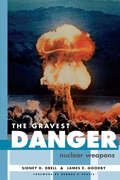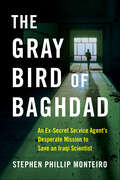- Table View
- List View
The Grand Chessboard
by Zbigniew BrzezinskiAs the twentieth century draws to a close, the United States has emerged as the world’s only superpower: no other nation possesses comparable military and economic power or has interests that bestride the globe. Yet the critical question facing America remains unanswered: What should be the nation’s global strategy for maintaining its exceptional position in the world? Zbigniew Brzezinski tackles this question head-on in this incisive and pathbreaking book. The Grand Chessboard presents Brzezinski’s bold and provocative geostrategic vision for American preeminence in the twenty-first century. Central to his analysis is the exercise of power on the Eurasian landmass, which is home to the greatest part of the globe’s population, natural resources, and economic activity. Stretching from Portugal to the Bering Strait, from Lapland to Malaysia, Eurasia is the ”grand chessboard” on which America’s supremacy will be ratified and challenged in the years to come. The task facing the United States, he argues, is to manage the conflicts and relationships in Europe, Asia, and the Middle East so that no rival superpower arises to threaten our interests or our well-being. The heart of The Grand Chessboard is Brzezinski’s analysis of the four critical regions of Eurasia and of the stakes for America in each arena--Europe, Russia, Central Asia, and East Asia. The crucial fault lines may seem familiar, but the implosion of the Soviet Union has created new rivalries and new relationships, and Brzezinski maps out the strategic ramifications of the new geopolitical realities. He explains, for example: Why France and Germany will play pivotal geostrategic roles, whereas Britain and Japan will not. Why NATO expansion offers Russia the chance to undo the mistakes of the past, and why Russia cannot afford to toss this opportunity aside. Why the fate of Ukraine and Azerbaijan are so important to America. Why viewing China as a menace is likely to become a self-fulfilling prophecy. Why America is not only the first truly global superpower but also the last--and what the implications are for America’s legacy. Brzezinski’s surprising and original conclusions often turn conventional wisdom on its head as he lays the groundwork for a new and compelling vision of America’s vital interests. Once, again, Zbigniew Brzezinski provides our nation with a philosophical and practical guide for maintaining and managing our hard-won global power.
The Grand Chessboard: American Hegemony and its Geo-Strategic Imperatives
by Zbigniew BrzezinskiAs the twentieth century draws to a close, the United States has emerged as the world's only superpower: no other nation possesses comparable military and economic power or has interests that bestride the globe. Yet the critical question facing America remains unanswered: What should be the nation's global strategy for maintaining its exceptional position in the world? Zbigniew Brzezinski tackles this question head-on in this incisive and pathbreaking book.The Grand Chessboard presents Brzezinski's bold and provocative geostrategic vision for American preeminence in the twenty-first century. Central to his analysis is the exercise of power on the Eurasian landmass, which is home to the greatest part of the globe's population, natural resources, and economic activity. Stretching from Portugal to the Bering Strait, from Lapland to Malaysia, Eurasia is the "grand chessboard" on which America's supremacy will be ratified and challenged in the years to come. The task facing the United States, he argues, is to manage the conflicts and relationships in Europe, Asia, and the Middle East so that no rival superpower arises to threaten our interests or our well-being.The heart of The Grand Chessboard is Brzezinski's analysis of the four critical regions of Eurasia and of the stakes for America in each arena-Europe, Russia, Central Asia, and East Asia. The crucial fault lines may seem familiar, but the implosion of the Soviet Union has created new rivalries and new relationships, and Brzezinski maps out the strategic ramifications of the new geopolitical realities. He explains, for example: Why France and Germany will play pivotal geostrategic roles, whereas Britain and Japan will not. Why NATO expansion offers Russia the chance to undo the mistakes of the past, and why Russia cannot afford to toss this opportunity aside. Why the fate of Ukraine and Azerbaijan are so important to America. Why viewing China as a menace is likely to become a self-fulfilling prophecy. Why America is not only the first truly global superpower but also the last-and what the implications are for America's legacy. Brzezinski's surprising and original conclusions often turn conventional wisdom on its head as he lays the groundwork for a new and compelling vision of America's vital interests. Once, again, Zbigniew Brzezinski provides our nation with a philosophical and practical guide for maintaining and managing our hard-won global power.
The Grand Chessboard: American Primacy and Its Geostrategic Imperatives
by Zbigniew BrzezinskiIn The Grand Chessboard, renowned geostrategist Zbigniew Brzezinski delivers a brutally honest and provocative vision for American preeminence in the twenty-first century. The task facing the United States, he argues, is to become the sole political arbiter in Eurasian lands and to prevent the emergence of any rival power threatening our material and diplomatic interests. The Eurasian landmass, home to the greatest part of the globe's population, natural resources, and economic activity, is the "grand chessboard” on which America's supremacy will be ratified and challenged in the years to come. In this landmark work of public policy and political science, Brzezinski outlines a groundbreaking and powerful blueprint for America's vital interests in the modern world. In a revised edition with a new epilogue, Brzezinski brings his seminal work up to date with commentary on the latest global developments, including the war in Ukraine, the re-emergence of Russia, and the rise of China.
The Grand Convergence
by James A. YunkerThis book describes, evaluates, and advocates for, sweeping changes in our global economic and political structure to ensure the prospects of global human civilization as we confront an uncertain future. It argues both for the Marshall Plan and for a limited federal world government to replace the quasi-anarchic international regime of today.
The Grand Design: A Novel
by John Dos PassosJohn Dos Passos's literary response to Franklin Delano Roosevelt's New Deal, The Grand Design critiques the gargantuan growth of bureaucracy in Washington during the Great Depression and World War II. The satiric novel conveys the author's frustration with federal overreach and the hollow rhetoric that sells it to the people. "War is a time of Caesars," writes Dos Passos as he laments the death of idealistic, intelligent enterprises at the desks of elitist administrators. After witnessing the Spanish Civil War claim so many well-intentioned men, he advises caution for America's New Dealers: "Some things we have learned, but not enough; there is more to learn. Today we must learn to found again in freedom our republic."
The Grand Failure: The Birth and Death of Communism in the Twentieth Century
by Zbigniew BrzezinskiThe history of Communism from 1917 to its break up in Russia in the 1980's and 90's.
The Grand Food Bargain: and the Mindless Drive for More
by Kevin D. WalkerWhen it comes to food, Americans seem to have a pretty great deal. Our grocery stores are overflowing with countless varieties of convenient products. But like most bargains that are too good to be true, the modern food system relies on an illusion. It depends on endless abundance, but the planet has its limits. Through beautifully-told stories from around the world, Kevin Walker reveals the unintended consequences of our myopic focus on quantity over quality. By the end of the journey, we not only understand how the drive to produce ever more food became hardwired into the American psyche, but why shifting our mindset is essential.
The Grand Idea: George Washington's Potomac and the Race to the West
by Joel AchenbachHow the nation expanded as a result of Washington's work and ideas.
The Grand Inquisitor's Manual: A History of Terror in the Name of God
by Jonathan KirschThe Surprising History and Legacy of the InquisitionThe renowned historian and critic Jonathan Kirsch presents a sweeping history of the Inquisition and the ways in which it has served as the chief model for torture in the West to this day. Ranging from the Knights Templar to the first Protestants; from Joan of Arc to Galileo; from the Inquisition's immense power in Spain after 1492, when the secret tribunals and torture chambers were directed for the first time against Jews and Muslims, to the torture and murder of hundreds of thousands of innocent women during the Witch Craze; and to the modern war on terror—Kirsch shows us how the Inquisition stands as a universal and ineradicable reminder of how absolute power wreaks inevitable corruption.
The Grand Jihad
by Andrew C MccarthyThe real threat to the United States is not terrorism. The real threat is the sophisticated forces of Islamism, which have collaborated with the American Left not only to undermine U.S. national security, but to shred the fabric of American constitutional democracy-freedom and individual liberty. In The Grand Jihad: How Islam and the Left Sabotage America, bestselling author Andrew C. McCarthy provides a harrowing account of how the global Islamist movement's jihad involves far more than terrorist attacks, and how it has found the ideal partner in President Barack Obama, whose Islamist sympathies run deep.McCarthy is the former federal prosecutor who convicted the notorious "Blind Sheikh" and other jihadists for waging a terrorist war that included the 1993 World Trade Center bombing. In his national bestseller, Willful Blindness: A Memoir of the Jihad (Encounter 2008), he explored government's conscious avoidance of the terrorist threat, which made the nation vulnerable to mass-murder attacks. In The Grand Jihad, he exposes a more insidious peril: government's active concealment of the Islamist ideology that unabashedly vows to "conquer America." With the help of witting and unwitting accomplices in and out of government, Islamism doesn't merely fuel terrorism but spawns America-hating Islamic enclaves in our midst and gradually foists Islam's repressive law, sharia, on American life. The revolutionary doctrine has made common cause with an ascendant Left that also seeks radical transformation of our constitutional order. The prognosis for liberty could not be more dire.
The Grand Old Duke of York: A Life of Prince Frederick, Duke of York and Albany 1763–1827
by Derek Winterbottom&“A modern look at HRH the Duke of York . . . a nice addition to Napoleonic Era history&” from the historian and author of The Mighty Montagus (The Napoleon Series Reviews). Oh, the grand old Duke of York, He had ten thousand men; He marched them up to the top of the hill, And he marched them down again. And when they were up, they were up, And when they were down, they were down, And when they were only half-way up, They were neither up nor down. Prince Frederick, Duke of York and Albany is famous because of the nursery rhyme which ridicules him for poor leadership but, as Derek Winterbottom&’s biography shows, he was far from incompetent as a commander. What is more, the famous rhyme does not even hint at his achievements as commander-in-chief of the British army during the Napoleonic Wars. His career as a commander and administrator and his scandalous private life are long overdue for reassessment, and that is what this perceptive and absorbing study provides. He transformed the British military machine, and the Duke of Wellington admitted that without York&’s reforms he would not have had the army that fought so well in the Peninsular War and at Waterloo. York also led a turbulent personal life which was engulfed by scandal when his mistress was accused of using her influence over him to obtain promotion for ambitious officers. Today the Duke of York is a neglected, often derided figure. This biography should go some way towards restoring his reputation as a commander and military reformer. &“This is an excellent, readable biography of a major but somewhat neglected historical figure.&” —History of War
The Grand Strategy of Comparative Law: Themes, Methods, Developments
by Luca Siliquini-Cinelli Mauro Balestrieri Davide GiantiThis book features original essays by leading academics and emerging researchers written in honour of a legal comparatist who, over the course of four decades, has played a major role in comparative law’s development: Pier Giuseppe Monateri.Rather than being just a celebrative work without analytical appeal, this book makes a significant contribution to the comparative legal literature by exploring key comparative law themes and recent developments in the field. Reflecting Monateri’s vast expertise, innovative thinking, and truly global network, the volume is divided into five thematic areas of both scholarly and practical significance: Comparative Law and Its Methods; Comparative Private Law; Law and Literature; The Politics and Ontology of Law; Comparative Law & Economics. Discussing novel case-studies as well as exploring Monateri’s importance to the comparative enterprise through various trajectories of inquiry – for example, normative, doctrinal, empirical, critical – this book takes a fundamental and much-needed step towards the establishment of comparative law as a fully-fledged academic discipline and professional practice.Addressing the current status and future direction of comparative law, this book will appeal to legal comparativists, as well as students and scholars with broader interests in the nature of legal cultures.
The Grand Strategy of the Habsburg Empire
by A. MitchellThe Habsburg Empire’s grand strategy for outmaneuvering and outlasting stronger rivals in a complicated geopolitical worldThe Empire of Habsburg Austria faced more enemies than any other European great power. Flanked on four sides by rivals, it possessed few of the advantages that explain successful empires. Its army was not renowned for offensive prowess, its finances were often shaky, and its populace was fragmented into more than a dozen ethnicities. Yet somehow Austria endured, outlasting Ottoman sieges, Frederick the Great, and Napoleon. The Grand Strategy of the Habsburg Empire tells the story of how this cash-strapped, polyglot empire survived for centuries in Europe's most dangerous neighborhood without succumbing to the pressures of multisided warfare.Taking readers from the War of the Spanish Succession in the early 1700s to the Austro-Prussian War of 1866, A. Wess Mitchell argues that the Habsburgs succeeded not through offensive military power or great wealth but by developing strategies that manipulated the element of time in geopolitical competition. Unable to fight all their enemies at once, the Habsburgs learned to use the limited tools at their disposal—terrain, technology, and treaty allies—to sequence and stagger their conflicts, drive down the costs of empire, and concentrate scarce resources against the greatest threat of the moment. Rarely holding a grudge after war, they played the "long game" in geopolitics, corralling friend and foe alike into voluntarily managing the empire's lengthy frontiers and extending a benign hegemony across the turbulent lands of middle Europe.A study in adaptive statecraft, The Grand Strategy of the Habsburg Empire offers lessons on how to navigate a messy geopolitical map, stand firm without the advantage of military predominance, and prevail against multiple rivals.
The Grand Titration: Science and Society in East and West
by Joseph NeedhamFirst published in 1969.The historical civilization of China is, with the Indian and European-Semitic, one of the three greatest in the world, yet only relatively recently has any enquiry been begun into its achievements in science and technology. Between the first and fifteenth centuries the Chinese were generally far in advance of Europe and it was not until the scientific revolution of the Renaissance that Europe drew ahead. Throughout those fifteen centuries, and ever since, the West has been profoundly affected by the discoveries and invention emanating from China and East Asia. In this series of essays and lectures, Joseph Needham explores the mystery of China's early lead and Europe's later overtaking.
The Grandchildren: The Hidden Legacy of 'Lost' Armenians in Turkey
by Ayse Gul AltinayThe Grandchildren is a collection of intimate, harrowing testimonies by grandchildren and great-grandchildren of Turkey's "forgotten Armenians"—the orphans adopted and Islamized by Muslims after the Armenian genocide. Through them we learn of the tortuous routes by which they came to terms with the painful stories of their grandparents and their own identity. The postscript offers a historical overview of the silence about Islamized Armenians in most histories of the genocide.When Fethiye cetin first published her groundbreaking memoir in Turkey, My Grandmother, she spoke of her grandmother's hidden Armenian identity. The book sparked a conversation among Turks about the fate of the Ottoman Armenians in Anatolia in 1915. This resulted in an explosion of debate on Islamized Armenians and their legacy in contemporary Muslim families.The Grandchildren (translated from Turkish) is a follow-up to My Grandmother, and is an important contribution to understanding survival during atrocity. As witnesses to a dark chapter of history, the grandchildren of these survivors cast new light on the workings of memory in coming to terms with difficult pasts.
The Grandmothers' Movement
by May ChazanAt the height of the African AIDS crisis older women mobilized across two continents and an ocean of difference to change the lives of innumerable African women confronting insecurity, violence, grief, and illness. In 2006 the Stephen Lewis Foundation launched its Grandmothers to Grandmothers Campaign, seeking to organize Canadians in solidarity with "Africa's grandmothers" - older caregivers who had lost their children to AIDS and were left to raise their grandchildren. Four years later, some 10,000 Canadians had joined the campaign. May Chazan's The Grandmothers' Movement explores the encounters, ideas, and circumstances that shaped this remarkable story of solidarity and struggle. Based on interviews, family trees, personal journals, and archival materials, Chazan provides the first analysis of the movement. Through personal reflections and powerful vignettes from nearly a decade of participation in grandmothers' lives in South Africa and Canada, she presents untold narratives and brings new humanity to the AIDS crisis in Africa. The Grandmothers' Movement tells a story of hope while challenging conventional understandings of the global AIDS response, solidarity, and old age. It is about the power of older women to alter their own lives through collective action and about the influence of transnational cooperation to effect positive global change.
The Grandmothers' Movement: Solidarity and Survival in the Time of AIDS
by May ChazanAt the height of the African AIDS crisis older women mobilized across two continents and an ocean of difference to change the lives of innumerable African women confronting insecurity, violence, grief, and illness. In 2006 the Stephen Lewis Foundation launched its Grandmothers to Grandmothers Campaign, seeking to organize Canadians in solidarity with "Africa's grandmothers" - older caregivers who had lost their children to AIDS and were left to raise their grandchildren. Four years later, some 10,000 Canadians had joined the campaign. May Chazan's The Grandmothers' Movement explores the encounters, ideas, and circumstances that shaped this remarkable story of solidarity and struggle. Based on interviews, family trees, personal journals, and archival materials, Chazan provides the first analysis of the movement. Through personal reflections and powerful vignettes from nearly a decade of participation in grandmothers' lives in South Africa and Canada, she presents untold narratives and brings new humanity to the AIDS crisis in Africa. The Grandmothers' Movement tells a story of hope while challenging conventional understandings of the global AIDS response, solidarity, and old age. It is about the power of older women to alter their own lives through collective action and about the influence of transnational cooperation to effect positive global change.
The Grantseeker's Guide to Winning Proposals
by Judith B. Margolin Elan K. DimaioPublished for development officers, nonprofit board members, fundraising consultants, and others in pursuit of grants from U.S. foundations, this guide provides real-world proposals that resulted in funding for a variety of needs, including general operating support, program development, staff salaries, and program evaluation. The featured proposals request anywhere from $5,000 to $500,000 in funding and were approved by international grantmakers such as the Charles Stewart Mott Foundation, large regional funders such as the Robert W. Woodruff Foundation, corporate donors such as the Mitsubishi Electric America Foundation, and local funders (including family foundations).
The Grass is Always Greener?: Unpacking Uzbek Migration to Japan (Politics and History in Central Asia)
by Timur DadabaevThis edited book unpacks the nature of Central Asian migration to East Asia. This book uses the case of Uzbekistan, the most populous country of Central Asia, and demonstrates the migration channels and adaptation strategies of migrants to the realities of Japan. What are the foreign policy engagements of Japan in Central Asia? How do they relate to the intensifying educational mobility and labour migration from Central Asia (in particular, Uzbekistan) to Japan? By answering these two questions, this book aims to detail the social factors that play important roles in localizing foreign policy engagements and narrating them in terms easily understood by the public.
The Grave of Truth
by Evelyn AnthonyMax has been having the same dream ever since the end of the war. The horrifying final moments in the Führer's Bunker, the brutal beating, the dying man--and his last desperate words. Years later Max hears the same words on the lips of another dying man, and finds himself caught in a chilling search for Hitler's last legacy--the Führer's final evil bequest. The dream is no longer a dream but a nightmare, and Max must try to live through it. . . .
The Graves Are Walking: The Great Famine and the Saga of the Irish People
by John Kelly“Though the story of the potato famine has been told before, it’s never been as thoroughly reported or as hauntingly told.” —New York PostIt started in 1845 and before it was over more than one million men, women, and children would die and another two million would flee the country. Measured in terms of mortality, the Great Irish Potato Famine was the worst disaster in the nineteenth century—it claimed twice as many lives as the American Civil War. A perfect storm of bacterial infection, political greed, and religious intolerance sparked this catastrophe. But even more extraordinary than its scope were its political underpinnings, and The Graves Are Walking provides fresh material and analysis on the role that Britain’s nation-building policies played in exacerbating the devastation by attempting to use the famine to reshape Irish society and character. Religious dogma, anti-relief sentiment, and racial and political ideology combined to result in an almost inconceivable disaster of human suffering.This is ultimately a story of triumph over perceived destiny: for fifty million Americans of Irish heritage, the saga of a broken people fleeing crushing starvation and remaking themselves in a new land is an inspiring story of revival.Based on extensive research and written with novelistic flair, The Graves Are Walking draws a portrait that is both intimate and panoramic, that captures the drama of individual lives caught up in an unimaginable tragedy, while imparting a new understanding of the famine’s causes and consequences.“Magisterial . . . Kelly brings the horror vividly and importantly back to life with his meticulous research and muscular writing. The result is terrifying, edifying and empathetic.” —USA Today
The Graves are Not Yet Full
by Bill BerkeleyAccount of the causes behind the Rwandan genocide of 1994.
The Gravest Danger: Nuclear Weapons
by James E. Goodby Sidney D. DrellThe mortal danger of nuclear weapons is unique in its terrifying potential for devastation on an unprecedented and unimaginable scale. In this book, Sidney D. Drell and James E. Goodby—each with more than twenty years' experience in national security issues both in public and private capacities—review the main policy issues surrounding nonproliferation of nuclear weapons. They address the specific actions that the community of nations—with American leadership—should take to confront and turn back the nuclear danger that imperils humanity. The nuclear genie, say the authors, cannot be put back in the bottle. Our most urgent task as a nation today is to successfully manage, contain, and reduce the grave danger of nuclear weapons—whether in the hands of adversaries or friendly states. This book hopes to stimulate active public dialogue on this important subject.
The Gravity Model in International Trade: Advances and Applications
by Steven Brakman Peter A. G. van BergeijkHow do borders affect trade? Are cultural and institutional differences important for trade? Is environmental policy relevant to trade? How does one's income or wage relate to the fact that trade partners are nearby or far away? These are just some of the important questions that can be answered using the gravity model of international trade. This model predicts and explains bilateral trade flows in terms of the economic size and distance between trading partners (e. g. states, regions, countries, trading blocs). In recent years, there has been a surge of interest in this model and it is now one of the most widely applied tools in applied international economics. This book traces the history of the gravity model and takes stock of recent methodological and theoretical advances, including new approximations for multilateral trade resistance, insightful analyses of the measurement of economic distance and analyses of foreign direct investment.
The Gray Bird of Baghdad: An Ex-Secret Service Agent's Desperate Mission to Save an Iraqi Scientist
by Stephen Phillip MonteiroA missing Iraqi scientist, an ex–Secret Service agent, and the threat of another biological terrorist attack—all these elements come together in the gripping true story of the Gray Bird of Baghdad. Iraqi Microbiologist Thamer Abdul Rahman Imran has information vital to stopping the unthinkable: a biological attack on the US. When he learns that the new Iraqi government wants to arrest him and the insurgents want to kill him, he goes into hiding. Racing against time, ex–Secret Service agent Steve Monteiro and his team set out on a mission to find the missing scientist and learn what he knows. The journey takes them from the White House to the Middle East as they fight bureaucrats in Washington who want them to fail. Why? And what is this vital information that Thamer possesses?The Gray Bird of Baghdad tells the true story of one’s man’s quest to protect his country and another man’s fight to save his family from the ravages of a country at war.
